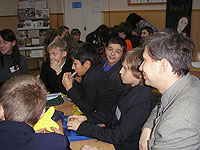Lessons of the Holocaust – Lessons of Tolerance
 Under such a title a one-day educational-methodical practical seminar for teachers took place in Kyiv Gymnasium for Oriental Languages on December 12, 2006. During the seminar guests (history teachers and methodologists from Kyiv schools) had a chance to see several interesting presentations. The first presentation I believe very effective and emotional was an English lesson for 7th grade dedicated to Theresienstadt and the efforts to understand the known poem of Paul Friedman, a dweller of the “exemplary ghetto”, about the butterfly that cannot live in ghetto… Children in 7th grade do not yet know all the terrible history of the Holocaust, but history of Terezin call for pondering on many issues: sympathy with others, human rights, child rights, an attempt of understanding extreme situation, generally issues of human tolerance. The lesson was so impressive, because none of the participants (teachers or students) was indifferent during the 40 minutes… The lesson was prepared and demonstrated by an English teacher of the Gymnasium Ms. Marichka Prokopchouk, who recently visited Yad Vashem in Jerusalem being a participant of the first Ukrainian group of teachers on an educational-methodical seminar on Holocaust history.
Under such a title a one-day educational-methodical practical seminar for teachers took place in Kyiv Gymnasium for Oriental Languages on December 12, 2006. During the seminar guests (history teachers and methodologists from Kyiv schools) had a chance to see several interesting presentations. The first presentation I believe very effective and emotional was an English lesson for 7th grade dedicated to Theresienstadt and the efforts to understand the known poem of Paul Friedman, a dweller of the “exemplary ghetto”, about the butterfly that cannot live in ghetto… Children in 7th grade do not yet know all the terrible history of the Holocaust, but history of Terezin call for pondering on many issues: sympathy with others, human rights, child rights, an attempt of understanding extreme situation, generally issues of human tolerance. The lesson was so impressive, because none of the participants (teachers or students) was indifferent during the 40 minutes… The lesson was prepared and demonstrated by an English teacher of the Gymnasium Ms. Marichka Prokopchouk, who recently visited Yad Vashem in Jerusalem being a participant of the first Ukrainian group of teachers on an educational-methodical seminar on Holocaust history.
Second presentation was dedicated to academic studies on Babiy Yar in sovereign Ukraine. It was prepared on a computer by students of the 11th grade of the Gymnasium. School leavers (11th grade) presented the recent academic findings on Babiy Yar and commented them. Their scientific advisor was famous in Ukraine teacher and methodologist Mr. Mikhailo Savchenko, who is vice principal on academic work in the Gymnasium and an avid teacher and learner of the Holocaust issues. It is Mr.Savchenko who initiates these seminars.
It is noteworthy that the seminar took place in Kyiv Gymnasium for Oriental Languages owing to the support of the Embassy of Israel in Ukraine, the Embassy of the USA in Ukraine, and Ukrainian Centre for Holocaust Studies.
Announcements
MoreLatest News
-
Research and methodological seminar for educators in Lviv
On 15-16 June, we met with more than twenty participants - mostly teachers from Lviv - to discuss the memory of the Holocaust, other cases of genocide on Ukrainian territory, and the current challenges of working with these topics.
[More] -
History of genocides in Ukraine: studying the experience and challenges of the present. Seminar in Kyiv
On 12-13 June, a research and methodological French-Ukrainian seminar History of genocides in Ukraine: studying the experience and challenges of the present was held in Kyiv. It was organised by the Shoah Memorial (Paris) and the Ukrainian Centre for Holocaust Studies (Kyiv) with the support of the Kuras Institute of Political and Ethnic Studies.
[More] -
Educational Materials “Nazi Genocide against Roma in Ukraine, 1941-1944”
The tragic fate of Roma people during WWII still remains largely unknown in Ukraine and generally in Europe. The new educational materials play an important role in returning Roma history and culture into the history and culture of modern Ukraine, unveiling Roma cultural heritage and the tragic events of WWII genocide against them.
[More] -
(No) Children’s Stories Exhibition returned to Chernivtsi
In May-June 2024, Chernivtsi once again invited the interactive exhibition (No) Children’s Stories. This time, it was hosted by Chernivtsi Gymnasium No. 17, and initiated by history and law teacher Varvara Bodnariuk. The students of 7-9 grades volunteered to host the exhibition and during the month of the event, they gave tours to more than 400 people, including students from their school, other schools in the city, and even the mayor of Chernivtsi and a foreign delegation from Dusseldorf (Germany) with the mayor of the city.
[More] -
Learning From The Past - Acting For The Future seminar
On 18-19 May, the seminar Learning from the Past - Acting for the Future was held in Kyiv. It was a joint event of The Olga Lengyel Institute, New York, and the Ukrainian Center for Holocaust Studies, funded by the Olga Lengyel Institute for Holocaust Studies and Human Rights.
[More]




